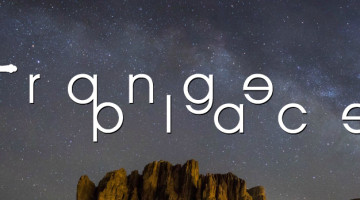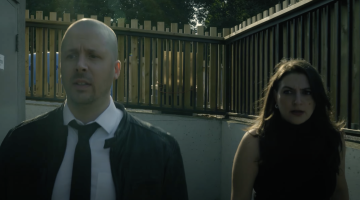“The Earth is flat.” “Man didn’t actually walk on the moon; he did it in a TV studio.” “The symbol of the Illuminati is on every dollar bill, so they must exist!” Whether you believe in such popular conspiracy theories or think they’re nothing but B.S., it’s evident that a sizable section of the world questions things that most rational individuals have long considered to be indisputable facts.
In the exciting sci-fi thriller Illuminagents, though, it’s the task of two agents to keep the tinfoil hat-wearing part of the populace from having their fringe beliefs become gospel truth. Created by Herman Wang (The Spell Tutor), Illuminagents co-stars Werner Artinger as veteran agent Nasmith Jones and Christina Leonard as his untested protege Nara Mason.
Partnered up by a shadowy body known as “The Organization”, Mason and Jones work to suppress the frequently dangerous views of those who doubt the “official narratives” put out by otherwise respected authorities, but their teaming is privately being undermined by a group of sinister counter-operatives intent on sabotaging the agents’ mission.
Illuminagents recently debuted its first episode (out of a planned five) on Seeka TV and The Fantasy Network, with all episodes complimented by special short-form content (a.k.a. “learning modules”) that takes viewers inside “The Organization” while offering context to the events that took place in each episode. Sometime this Fall, Wang will launch efforts to raise funds for filming the show’s remaining episodes – including a special musical episode – on Seed&Spark.
Before formally beginning that campaign, though, Wang took time to chat with Snobby Robot about how Illuminagents dramatizes actual conspiracy theories without being disdainful to those who subscribe to such theories.

L-R: ILLUMINAGENTS co-stars Werner Artinger and Christine Leonard.
Chris Hadley: What (and/or who) inspired you to create Illuminagents, and in what ways have popular real life conspiracy theories (if at all) influenced/inspired the storylines of the show?
Herman Wang (creator, Illuminagents): It’s interesting to me from a psychological viewpoint to see how people will reject well-established knowledge because of distrust or disenfranchisement. It’s overly simplistic to dismiss these people as merely stupid; there’s a social phenomenon happening here, and I carried that interest over into the creation of Illuminagents.
I’ve always enjoyed science fiction for its ability to examine the human condition. The conspiracies we use in the show all exist in today’s world – none of them were made up. There’s a whole treasure trove of good material just waiting for us to incorporate into a fun narrative.
CH: Your last web series, The Spell Tutor, won several awards and lots of praise during its time on the festival circuit. How did the experience of making that show prepare you for the creative challenges and responsibilities of making Illuminagents?
HW: By the second season of The Spell Tutor, we had fallen into a structured way of working that allowed us to accomplish everything that we did. Making that web series was a de facto film school for me, while also being a lot of fun and allowing me to make important contacts in the film world. Luckily, those contacts have carried over well into making Illuminagents. I like to think that I’ve created a healthy working environment where people are willing to come back to work with me again for this new project.
CH: In the show’s press release you mentioned that the purpose of Illuminagents is not to mock conspiracy theories, but to incorporate them within a sci-fi story and to get viewers to consider the basis of those theories. How do you plan to do all that with this show, its plotlines and its characters?
HW: It’s been demonstrated via scientific study that directly challenging people’s false beliefs doesn’t accomplish what you want; if anything, it causes those people to dig their heels in even deeper. Illuminagents was meant to be quirky entertainment, yes, but also to kind of apply reverse psychology. By setting the show in a universe where all the conspiracy theories are true, we can illustrate just how enormous an effort would be required to maintain all of it. The “learning modules” we created for the pilot and video extras are an inside peek into the large-scale machinations of “The Organization”.
CH: How did you find the show’s cast?
HW: Christina Leonard had worked with us on The Spell Tutor, so when she expressed interest in Illuminagents I cast her on the spot, feeling she’d be perfect for the “rookie agent” role. Originally the role of her partner agent was cast to Steve Kasan. Unfortunately, as happens sometimes in the film world, a week before our shoot he got offered a feature film role with a shoot schedule overlapping ours.
For an actor, taking a feature over a web series pilot is an easy choice, and he left the project on good terms after giving me a heads-up. That still left me with finding a replacement in less than a week – we couldn’t reschedule because location deposits had already been paid.
So I went to Werner Artinger, who I had also worked with on The Spell Tutor, rather than take a risk on an unfamiliar actor. I also enlisted Lawrene Denkers (Professor Caltain from The Spell Tutor) to be the narrator of our learning modules, albeit with a Canadian accent this time.

The specially designed “Horizon Generator” prop, as seen in episode 1 of ILLUMINAGENTS.
CH: What was the production process like, including for the visual effects?
HW: Since we shot only the pilot at first, it allowed us to focus on it rather than spreading effort out over a handful of episodes. But we were still working on a fairly low budget. We lucked out with our “Horizon Generator” prop, which I found under a layer of dust in my brother-in-law’s elevator company workshop.
The VFX for Illuminagents had to be different from what we did for The Spell Tutor. Instead of organic-looking “magic”, I wanted a more technological feel, with sinister overtones. For example, we designed Nasmith’s “force beam” to be artificial-looking as well as appearing to be effortless to use. There are subtle things we slipped in there too – during Nara’s vlog entry, the computer displays information in direct response to what she’s saying. I wanted to suggest the creepy side of privacy invasion that current technology allows.
CH: In addition to the episodic content, there are several “extras” that come in the form of training modules for the Illuminagents agency. How will that content serve to supplement the overall story world of the series, while also enhancing the show’s storylines and giving viewers a greater understanding of that world?
HW: The original intent was to do something stylistically different from a typical narrative while giving an inside look into the more sinister workings of “The Organization”. When the pandemic hit, it became an ideal work-from-home project for the team. There’s no filming with actors to be done: it’s all voice-over, graphic design and animation. So it’s allowed us to continue creating new supplemental content during this time.
The first extra explains what Nasmith actually did to stop the fleeing thief, which we did kind of spring on the audience without any context. At the same time, we wanted to create the undertone that the agents are ultimately considered disposable by the people they work for. That will come into play later on in the series.
CH: You’re also planning a musical episode of Illuminagents for later in the show’s first season. Any details you’d like to share on that?
HW: On a personal level, it was a new challenge to push my envelope. On a competitive level, I’ve seen several musical web series episodes over the years while visiting festivals with The Spell Tutor, so I wanted to show the world my take on what that could be.
As for the episode itself, it’s the season finale and we came up with an in-universe explanation for why everyone is singing – I don’t want to spoil it but if you stick with us through the whole season, I think it’ll be a worthwhile reward. During pre-production we had a fun version of a table read where we booked a private karaoke room to demo our singing abilities in a comfortable setting. I even joined in!

Agent Nasmith Jones (Werner Artinger) uses his powerful “force beam” to stop a horizon generator thief (played by Paul Renshaw) in the first episode of ILLUMINAGENTS.
CH: Who do you think would like to watch Illuminagents, and in what ways is it similar to (and/or different from) other shows that blend comedy with sci-fi?
HW: We’re aiming for anyone who enjoys sci-fi with a touch of humor to it. The show is similar to something like Chuck or The Orville, where there are intrigue and real stakes, but it’s still kind of goofy at times.
I’ve tried to create something that fits specifically into the web series mold with our unique combination of live action, vlog-style and motion graphic animation. So I hope it’s going to feel different from a television viewing experience, especially with the extras we’re adding to the season.
CH: What do you hope people get out of watching Illuminagents?
HW: I’m hoping the show can be entertaining as far as the action and humor go, as well as the plot of our long-form story arc. But if we can also get people thinking about what they choose to believe and why, then I’ll be satisfied that we’ve created good science fiction.
NOTE: Wang says that the first episode of Illuminagents and its accompanying extra content will be closed-captioned.
ON THE WEB: www.illuminagents.com
Seeka TV: https://watch.seeka.tv/illuminagents
The Fantasy Network: https://watch.thefantasy.network/tv-show/illuminagents/
FACEBOOK: https://www.facebook.com/illuminagents
TWITTER: https://twitter.com/illuminagents
INSTAGRAM: https://www.instagram.com/illuminagents/










No Comment